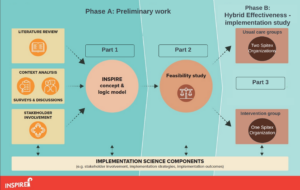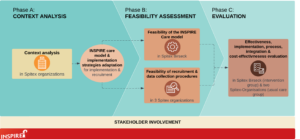Life expectancy is rising in Switzerland, leading to an increasing proportion of home-dwelling older adults needing assistance. Various providers offer support and care, but older people often require a combination of services that are neither centralized nor coordinated. This fragmentation exposes them to risks such as multiple service use, gaps in information, inappropriate or contradictory recommendations, and medication errors. Consequently, older individuals and their relatives experience insecurity, stress, and strain. Additionally, fragmented care results in higher healthcare costs due to unnecessary hospital admissions, emergency department visits, and other superfluous services. Investing in integrated care models can prevent these adverse outcomes. INSPIRE addresses these critical issues, demonstrating how new care models can be sustainably implemented in real-world settings with the use of implementation science methods. Given the demographic changes in the population of Canton Basel-Landschaft and the impending shortage of healthcare personnel, the organization of healthcare for older adults in the canton has been reevaluated. On November 16, 2017, the District Administrator enacted the new care legislation Altersbetreuungs- und Pflegegesetz (APG), which has been in effect since January 1, 2018. The new care law mandates a reorganization of Canton Basel-Landschaft (BL) into larger care regions, requiring collaboration at the municipal level. This legal framework also requires the establishment of Information and Advice Centers (IACs) to provide guidance on aging, age-related topics, and support and care of older adults. Each IAC must have at least one nurse to offer advice and assessments, particularly for individuals considering nursing home admission, and to facilitate aging in place with appropriate support systems. A central objective of these care regions is to develop a comprehensive care concept that ensures adequate outpatient, intermediate (e.g., day clinics), and inpatient care. Given the demographic changes in the population of Canton Basel-Landschaft (BL) and the introduction of the new care legislation, Altersbetreuungs- und Pflegegesetz (APG), the conditions were ideal for advancing integrated care in the region. Consequently, the Canton partnered with the Department Public Health of the University of Basel to establish the INSPIRE Project. The INSPIRE Project seeks to develop, implement, and evaluate a community-based integrated care model for frail, home-dwelling older adults, enabling them to age in place and delaying the need for nursing home admissions in a real-world setting. INSPIRE is a multiphase project that utilizes implementation science methods and follows the MRC framework for developing and evaluating complex interventions. Fig 1. INSPIRE Project overview (preliminary work) Phase A focused on developing the INSPIRE care model, its program theory and a preliminary list of strategies to overcome potential implementation barriers. This phase involved a review of evidence on core components of nurse-led integrated care models for home-dwelling older adults (Deschodt et al, 2020) and a contextual analysis (Yip et al, 2021). Contextual data were gathered from stakeholder surveys, local, national, and international reports, and a population survey of home-dwelling older adults aged 75+ in Canton Basel-Landschaft (Siqeca et al, 2021). Stakeholder involvement has been a crucial element along the different phases of this project through the organization of a cantonal and local stakeholder groups actively engaged in the development and implementation of the care model As a next step, the feasibility of the INSPIRE care model was tested in a newly created Information and Advice Center (IAC) of Canton BL. This evaluation involved assessing the model’s acceptability, fidelity, feasibility, and reach. Implementation mapping was used to identify strategies to enhance the model’s reach among community-dwelling older adults(Mendieta et al, 2024). Our feasibility evaluation demonstrated that despite a good perception of feasibility and acceptability, there were some problems with delivering the care model as planned (low fidelity) and the reach of the care model to frail home-dwelling older adults. These results underscore the necessity for improved collaboration with community care providers to enhance both fidelity and reach. Key factors identified for success include sufficient time, organizational readiness, strong leadership, shared values, clear goals, and effective communication. Building on these findings, INSPIRE will now partner with a local home-care organization (Spitex ) to implement the care model. Adaptations of the care model will be made to fit Spitex’s context. The feasibility of these adaptations will be assessed before moving to Phase B, which will test the model’s effectiveness using a quasi-experimental design. Fig 2. New phases of the INSPIRE 2 Project The New INSPIRE 2 Project: A Three-Phase Approach Phase A focuses on analyzing the new context within a home-care organization and identifying implementation strategies to address barriers at various levels that may impact the implementation of the INSPIRE care model. This phase also involves contextually adapting the INSPIRE care model to fit the new setting. Phase B involves evaluating the feasibility of the INSPIRE care model in the new home-care organization setting. This phase also includes assessing the feasibility of recruitment and data collection procedures. In Phase C, we will assess the implementation and effectiveness of the INSPIRE care model, focusing on perceptions of person-centred care as well as other patient, service, and implementation outcomes. We will employ system science to analyze changes in the care network of home-dwelling older adults and conduct a health-cost evaluation to determine the value of investments and affordability at the cantonal level.Background
The new care legislation “Altersbetreuungs- und Pflegegesetzt (APG)” in Canton Basel-Landschaft
The ImplemeNtation of a community-baSed care Program for home dwelling senIoR citizEns (INSPIRE) Project
INSPIRE aims to develop and implement an effective and sustainable community-based care program for senior citizens in Canton Basel-Landschaft using new methods of public health and implementation research
The INSPIRE Project: preliminary work

INSPIRE 2: Transitioning to Home-Care Organizations Based on Lessons Learned

